Category: HVAC
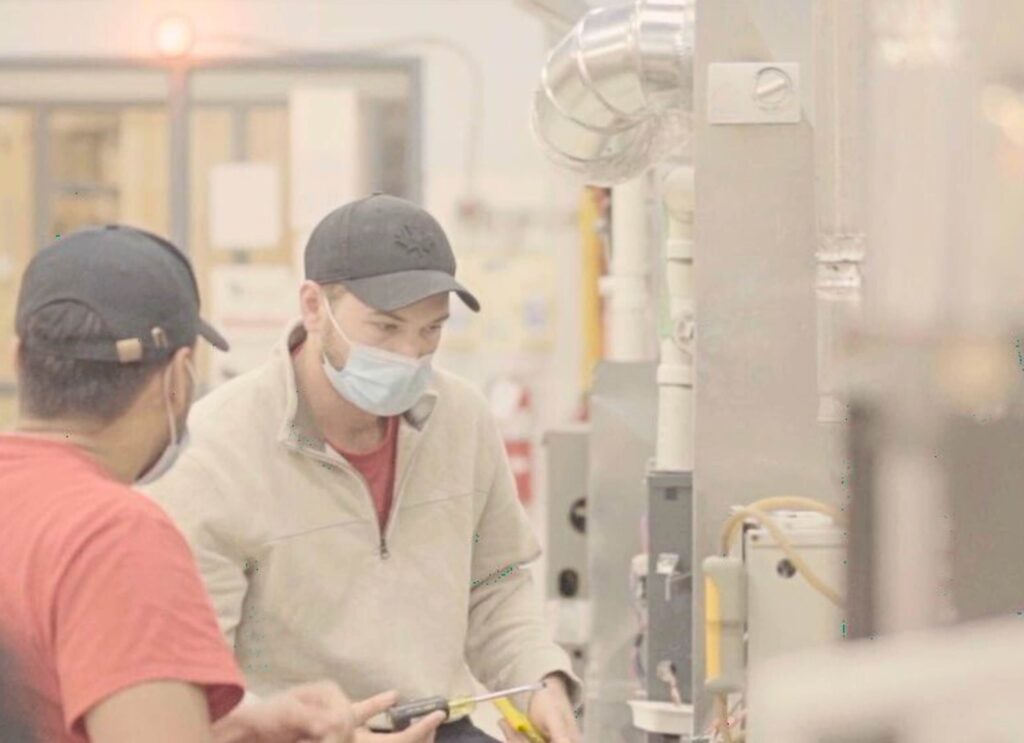
Just as the saying goes, to know where something is going, you have to know where it’s been. For students just starting their HVAC technician training, exploring and understanding the history of HVAC systems is crucial. It provides valuable context for their studies and sets the pace for future endeavours.
HVAC technology has seen substantial advancements, transforming how we manage indoor heating, cooling, and ventilation. These innovations improve our living and working conditions and prepare us to meet the demands of future climate challenges. Because of this, it is important to look back at where it all began. Let’s explore a brief history of HVAC.
HVAC Technician Training Explores Its Ancient Origins
Our forebears were already developing basic HVAC systems before the first HVAC technician training program was even created. The ancient Romans represent a significant example of early recorded instances of designing heating and cooling systems.
In a system that has now been termed and acknowledged as a “hypocaust,” the Romans used to circulate hot air underneath their floors using a specific technique. The air was channeled through raised pillars, warming the room and delivering essential indoor comfort for its occupants.
The Romans were not alone, the Egyptians also used an interesting technique to cool indoor spaces. The use of wet reed mats to provide indoor cooling, which was then considered a unique evaporating cooling technique, harnessed the natural cooling effect of water evaporation.
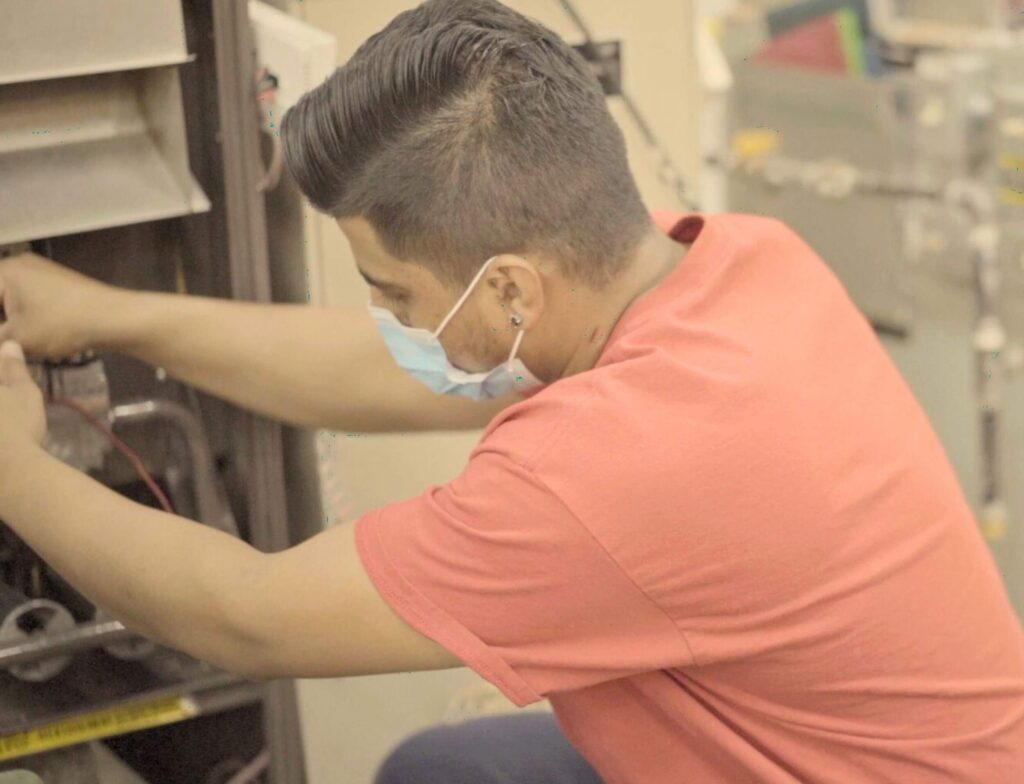
How the Industrial Revolution Influenced Early HVAC Development
The advent of the Industrial Revolution in the 19th century sparked many significant advancements in heating and ventilation technology, especially steam heating. As industrial innovation and technology continued to pick up steam, so did steam heating systems.
These steam heating systems depended on boilers to heat water and channel steam through pipes leading to radiators. These radiators then dispersed the heat across strategically placed openings to warm the rooms. Concurrently, mechanical ventilation systems became prevalent in Western homes, significantly advancing residential climate control.
When Willis Carrier invented the first mechanical air conditioning unit in 1902, a new dawn in indoor climate control/conditioning beckoned. The entry of refrigerants, such as freon, in the 1930s would later boost the operational quality and efficiency of air conditioning systems, changing the game.
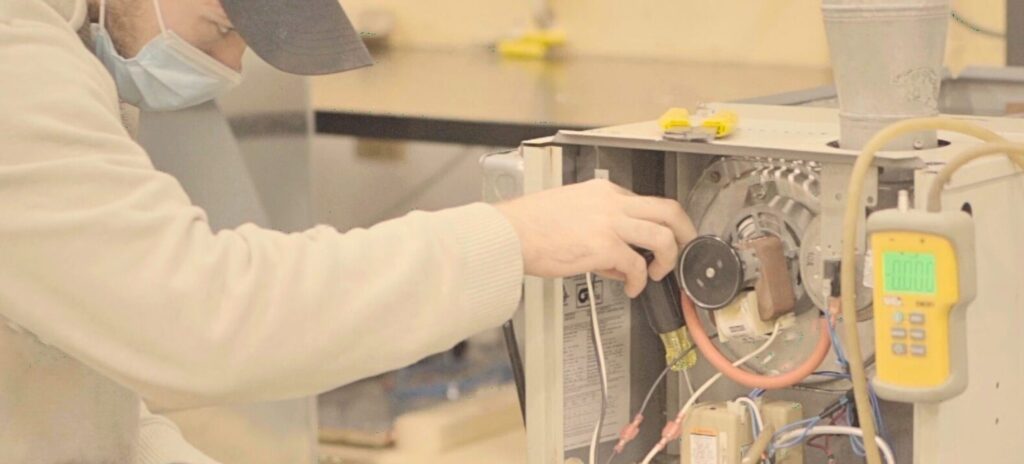
The Effect of Contemporary Technological Advancements
Over the past two centuries, HVAC technology has advanced quickly due to progress in engineering, materials science, and environmental consciousness. Innovations began with the introduction of freon-like refrigerants and were followed by advancements in digital controls, the integration of renewable energy sources, and improvements in energy efficiency. Such advancements include inventions like programmable thermostats for energy efficiency and the integration of smart HVAC controls for remote monitoring and automation.
The HVAC industry’s focus has shifted entirely towards energy efficiency and sustainability. Smart HVAC controls and eco-friendly refrigerants are becoming more common, with innovative solutions continually emerging.
Students in our HVAC college learn all about these innovative solutions, with their coursework now focusing on things like renewable energy systems and energy-efficient HVAC technologies.
Students from our training program applaud the quality of education and support they get. Jason Boyer is one of those students and a now-practicing technician. In his words, “I choose NATS because it is a hands-on school; they teach you what you need to know and you apply the knowledge in the lab, and there’s a lot of skilled technicians with the experience and know-how there.”
This emphasis on cutting-edge technology and sustainable practices ensures that our graduates, like Jason, are prepared to excel in their careers and lead the industry toward a greener future. At NATS, we pride ourselves on providing education that is both relevant and transformative, equipping students with the skills and knowledge to thrive in a rapidly evolving HVAC landscape.
Do you want to become an HVAC technician?
Contact NATS today to learn more.
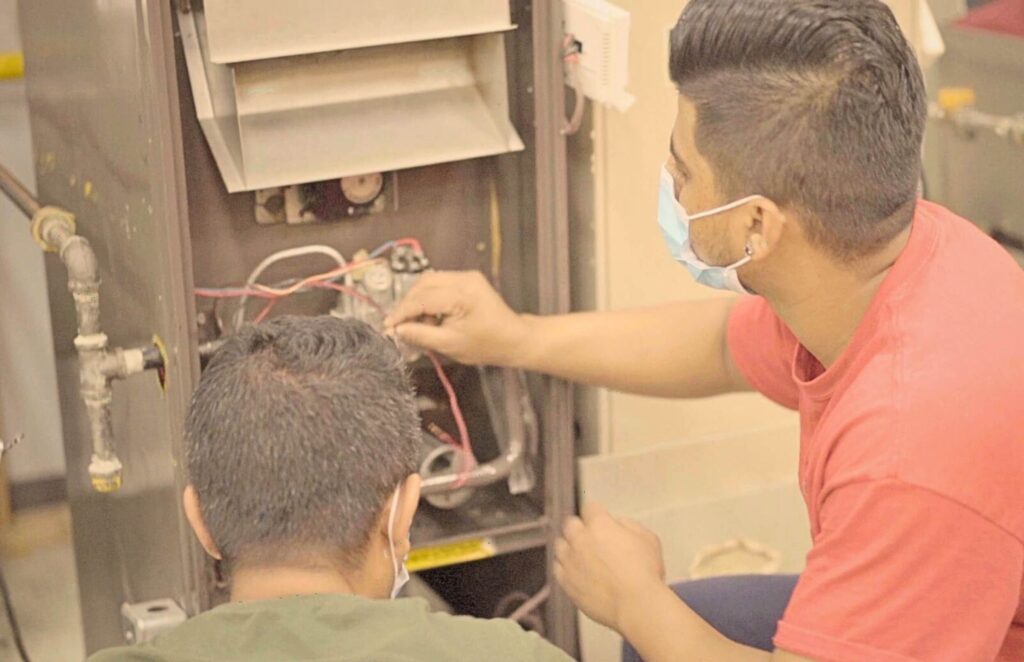
Traditionally, Heating, Ventilation, and Air Conditioning (HVAC) professionals are known for playing an integral role in maintaining the comfort and safety of indoor environments. Yet, the HVAC field is vast, with many career paths beyond traditional settings. These days, being an HVAC technician means not being limited to indoor or residential spaces alone.
HVAC training graduates possess a skill set in high demand, thanks to the essential nature of climate control in residential, commercial, and industrial spaces. Here, we explore three interesting non-traditional work settings where HVAC training graduates can apply their skills and knowledge, each offering unique challenges and opportunities for career growth.
1. Make an Impact on Environmental Conservation in Renewable Energy Sectors
The push towards sustainability and renewable energy has opened new avenues for HVAC professionals. In this sector, HVAC technician training graduates can work on integrating heating and cooling systems with solar panels, wind turbines, and other renewable energy sources.
This environment is about installing or repairing traditional systems and innovating and working on the cutting edge of eco-friendly technologies. Professionals in this field have the opportunity to contribute to the development of green buildings and energy-efficient homes, making a tangible impact on environmental conservation and energy independence.
2. Industrial and Manufacturing Plants Provide a Stimulating Work Environment
HVAC specialists encounter complex and wide-ranging difficulties in industrial settings that are absent in residential or commercial contexts. To maintain the integrity of the items being created and the safety of the workers, manufacturing plants and other industrial facilities heavily rely on sophisticated HVAC systems to regulate environmental conditions. These systems must be designed with large-scale area ventilation and temperature control within strict parameters. In these settings, regulations such as this are central to the specialized manufacturing processes within the facility.
To succeed in this field, budding HVAC technicians must thoroughly understand industrial operations. Armed with insights from their completed HVAC technician courses, they must understand how differing environmental conditions might affect various manufacturing phases and how crucial it is to set up HVAC solutions to satisfy these requirements.
Working in such environments can demonstrate one’s capacity for large-scale system design and management and advance technical competency and problem-solving skills. In addition to technical expertise, the position requires the ability to think creatively and to guarantee that HVAC systems seamlessly integrate with the particular needs of every industrial process.
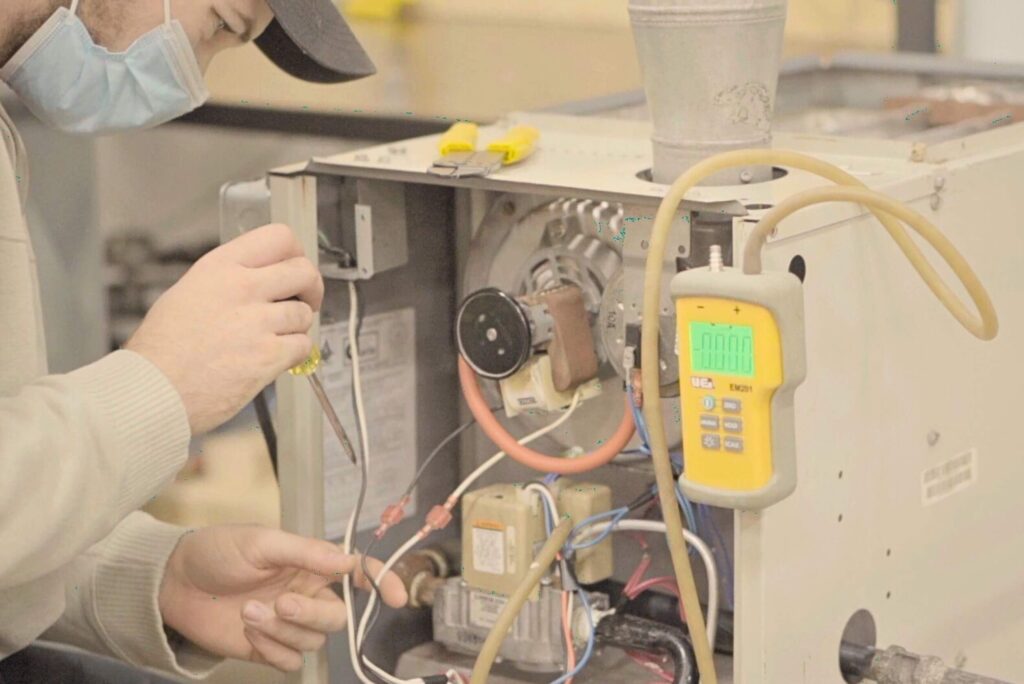
3. Explore Healthcare Facilities Opportunities After HVAC Technician Training
Healthcare facilities like hospitals, clinics, and research laboratories demand exacting climate control to uphold sterile conditions and guarantee patient comfort. This presents a distinct set of challenges for HVAC professionals. Professionals who work in these environments are tasked with installing and maintaining systems that regulate temperature, humidity, and air purity. Given the high stakes of healthcare settings, HVAC technicians and engineers in this field must navigate and comply with rigorous regulations and standards to ensure their systems support the facility’s vital operations.
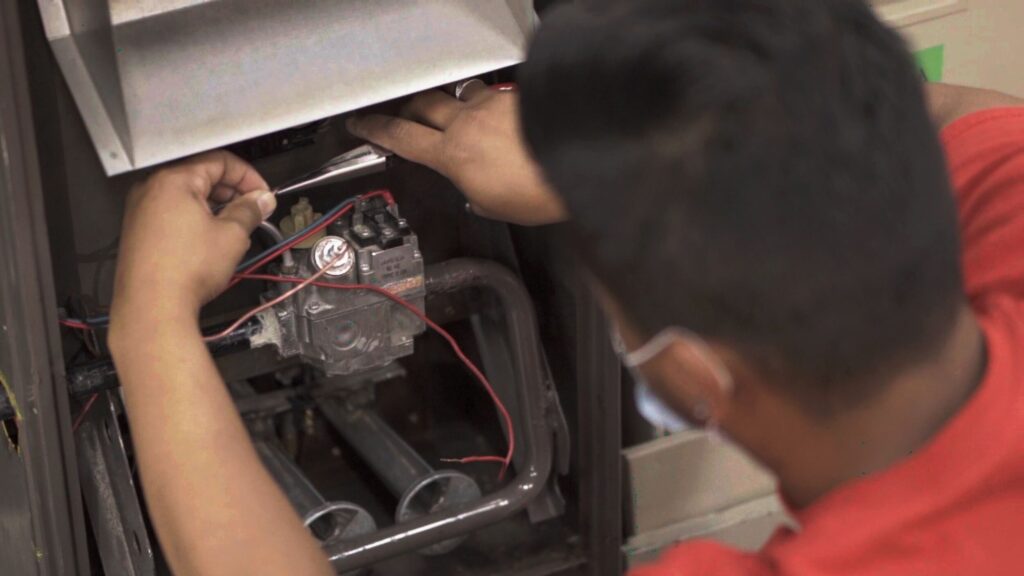
This setting offers HVAC graduates technical hurdles and the fulfilling opportunity to play a key role in patient care and safety. Their work directly impacts the healing environment, contributing to the well-being of patients and the efficiency of healthcare processes. This sector uniquely blends engineering and technology challenges with the human aspect of healthcare, making it a profoundly rewarding field for HVAC professionals dedicated to making a difference.
Are you interested in an HVAC technician career?
Contact NATS for more information.
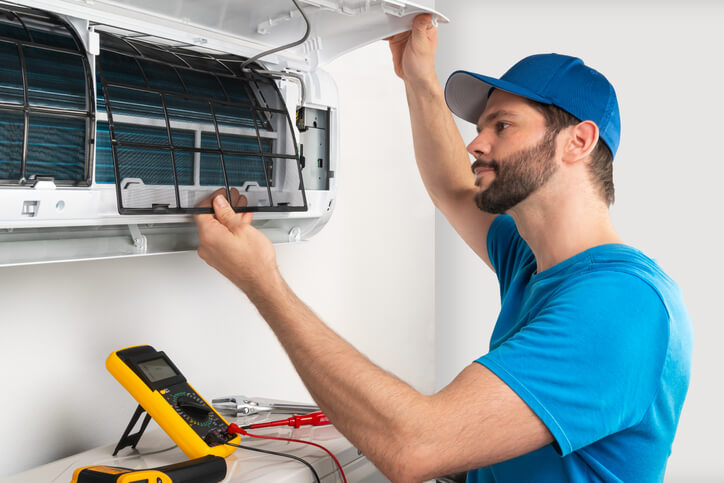
Heating, ventilation, and air conditioning (HVAC) systems are essential for maintaining comfortable indoor environments, but they can pose potential hazards if not handled properly. Proper training is crucial for ensuring safety when working with HVAC systems.
However, even after completing HVAC training, professionals can make safety mistakes that jeopardize their well-being and the well-being of those around them. In this blog post, we will discuss three common safety mistakes to avoid after HVAC training.
1. Neglecting Personal Protective Equipment (PPE)
One of the most fundamental safety mistakes HVAC professionals make is neglecting to wear appropriate personal protective equipment. PPE is essential to safeguard against potential hazards, such as electrical shock, refrigerant exposure, or cuts from sharp materials. After completing HVAC training, it’s crucial to remember that PPE is not optional but required for every job.
As our HVAC technician courses specify, the specific PPE needed can vary depending on the task. Still, it often includes safety glasses, gloves, steel-toed boots, and insulated electrical gloves for electrical work. Ignoring these safety measures can result in injuries that could have been easily prevented.
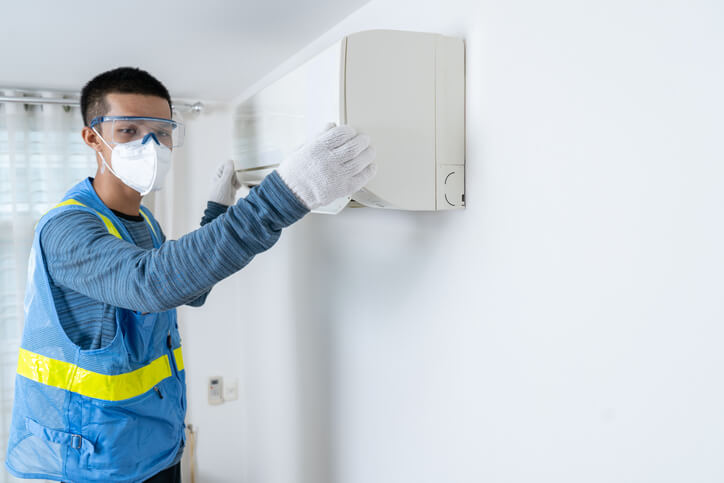
Additionally, HVAC technicians must be vigilant about the maintenance of their PPE. Regularly inspect and replace any damaged or worn items to ensure they remain effective. A small investment in PPE can prevent severe injuries and keep HVAC professionals safe on the job.
2. Skipping Safety Checks and Procedures
HVAC systems are complex, and the installation, maintenance, and repair processes involve various safety checks and procedures that should be followed rigorously. After completing HVAC technician training, technicians may become complacent or skip certain steps, thinking they can rely on their experience.
However, neglecting safety checks and procedures can lead to catastrophic consequences. For instance, failing to secure and test gas lines properly can result in gas leaks and potential explosions. Skipping the inspection of electrical connections can lead to electrocution or fires. Ignoring safety checks is not only dangerous but can also be costly in terms of property damage and potential lawsuits.
To avoid this safety mistake, HVAC professionals should always follow safety protocols and checklists provided by their employers or industry standards. These procedures are in place for a reason and are designed to protect technicians, clients, and property.
3. HVAC Technician Training Promotes Ensuring Adequate Equipment Inventory
As unlikely as this might seem, HVAC technicians can fail to maintain an adequate inventory of their tools and equipment. A well-prepared HVAC technician should have a comprehensive set of tools and materials to perform their job efficiently and safely. This aspect must be revised to avoid unnecessary delays, substandard work, and potentially hazardous situations.
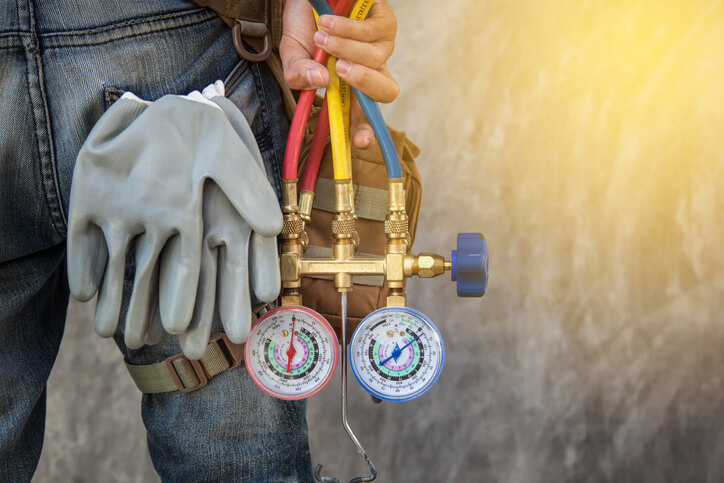
Some common inventory-related mistakes to avoid include:
- Lack of essential tools: Forgetting or not carrying crucial tools leads to improvisation, which can be unsafe. Always ensure you have the necessary tools, such as wrenches, screwdrivers, multimeters, and pipe cutters.
- Insufficient safety equipment: Many HVAC tasks involve working with electricity, refrigerants, or elevated positions. Neglecting safety equipment like gloves, safety glasses, fall protection gear, and arc flash suits can result in severe accidents.
- Disorganized work vehicle: Maintaining a well-organized work vehicle is vital for efficiency and safety. A cluttered and disorganized van can lead to accidents when tools or equipment are not stored securely.
Are you interested in our HVAC technician diploma?
Contact NATS for more information.
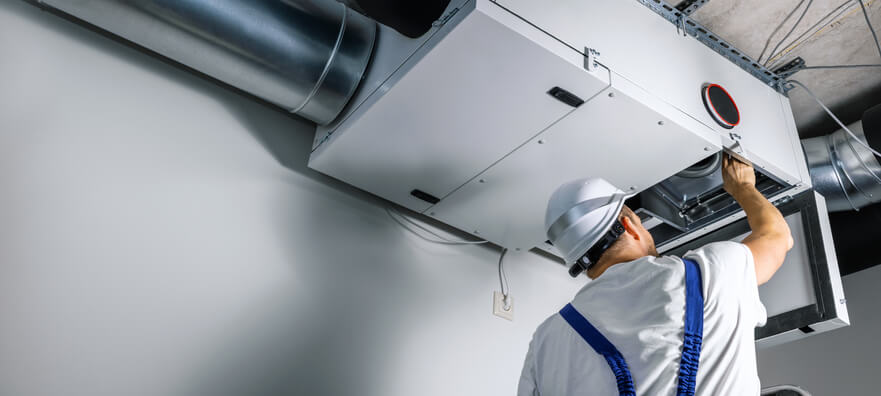
If you’re thinking about pursuing a career in the HVAC (Heating, Ventilation, and Air Conditioning) industry, you’re on track to enter a thriving field that offers a blend of hands-on work and technical problem-solving. But where do you start? How do you gain the necessary experience and exposure to decide if this is the right field for you? One often overlooked but highly beneficial position to consider is that of an HVAC Maintenance Assistant or HVAC Helper.
In this blog post, we’ll dive deep into what an HVAC Maintenance Assistant does, the benefits of starting in this position, and why it could be the ideal first step for aspiring HVAC professionals after your HVAC training.
What Is an HVAC Maintenance Assistant?
An HVAC Maintenance Assistant, often referred to as an HVAC Helper, is an entry-level position in the HVAC industry. As the name suggests, the primary role of this position is to assist HVAC technicians in their daily tasks. This can involve anything from handling tools, preparing work areas, and performing basic maintenance, to assisting with installations and repairs.
HVAC helpers focus on heating, cooling, and ventilation systems, assisting with tasks like inspecting equipment, installing humidifiers, preparing tools, cleaning air ducts, and maintaining company vehicles. They also handle the general upkeep of property interiors and exteriors. They ensure preventative maintenance is followed and assist with basic repairs across HVAC/R, plumbing, and electrical systems. Their duties also cover equipment repair, basic carpentry, furniture moving, and area maintenance like cleaning and lawn care. With the rise of clean energy systems, both roles need familiarity with electricity-based HVAC/R mechanics, such as heat pumps.
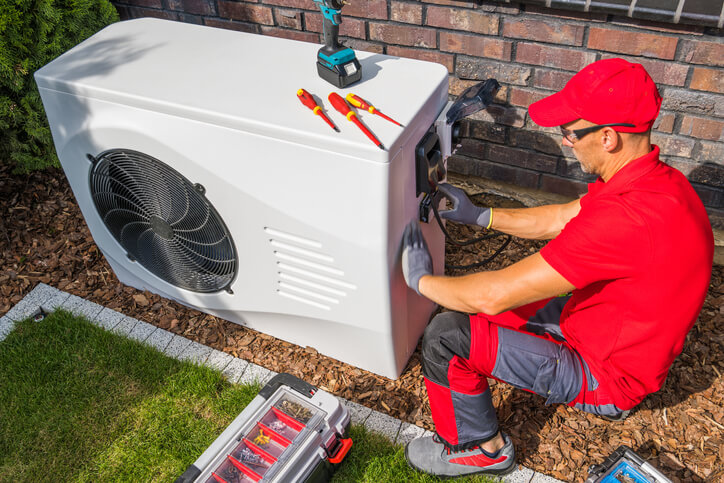
Why Consider Starting As An HVAC Maintenance Assistant?
Before committing to formal HVAC technician training or certifications, becoming an HVAC Helper offers a taste of the industry, granting invaluable first-hand experience of daily operations. This can be instrumental in gauging if the profession aligns with your aspirations. (this is generally not allowed. Most situations in hvac require a helper/assistant to already have the G3 certification)
Another notable advantage of beginning as an assistant is the “learn while you earn” model, a contrast to professions demanding early educational investments. This position also brings the opportunity for mentorship; by working alongside seasoned HVAC technicians, you gain access to a reservoir of knowledge and insights not always encapsulated in official training. Moreover, starting as an HVAC Helper is merely a foundation; with accrued experience and further training, there’s potential to ascend to more advanced roles, ranging from technician to management positions.
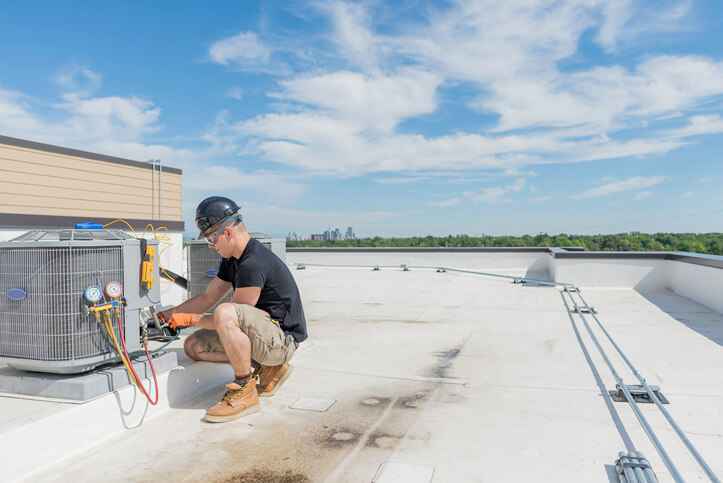
How to Become An HVAC Maintenance Assistant
HVAC helpers and maintenance assistants typically possess a high school diploma or GED, although formal education might not be a requirement for some. Previous experience is not usually mandatory, as workers often undergo a few weeks of on-the-job training to develop proficiency in their respective tasks.
(again this can be a bit misleading as a certificate is usually required to work on hvac systems and appliances.)
However, having vocational training in a relevant trade, understanding HVAC operations (particularly in energy-efficient technologies like heat pumps), or holding one to two years experience can give job seekers an edge, making them more appealing to employers compared to candidates without such qualifications.
Those aspiring to advance from these entry-level roles to become technicians or installers may consider applying for apprenticeship programs, pursuing vocational training, obtaining an HVAC technician diploma, or enrolling in courses provided by HVAC/R industry bodies, manufacturers, or distributors, with a focus on equipment and components used in clean energy systems.
Are you looking for a world-class HVAC technician college?
Contact NATS for more information.
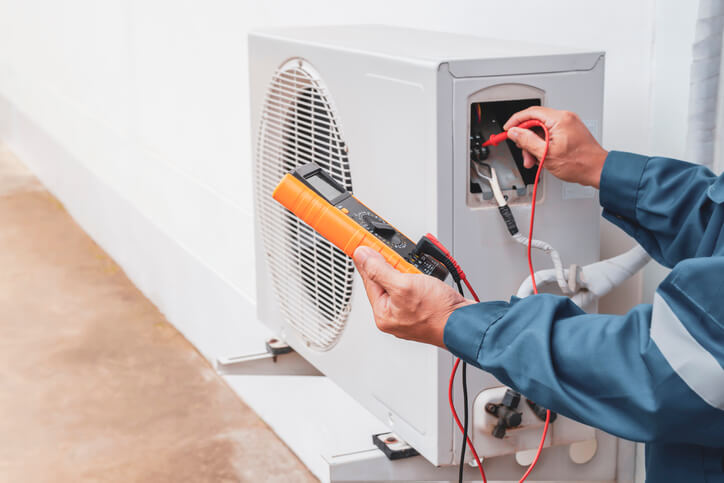
A technician is only as good as his tools, so the old saying goes. While an HVAC technician career is notable for its low entry barrier, quality tools are an indispensable expense for budding technicians. As a recent graduate entering the workforce and industry, you may need to manage your budget efficiently, particularly at the earliest stages of your career. One of the first steps in establishing yourself as a capable HVAC professional is assembling a toolkit that equips you for success without breaking the bank. This blog will explore how HVAC technician grads can build a comprehensive toolkit on a budget.
Prioritize Essential Tools While Exploring Budget-Friendly Brands
Start by identifying the essential tools required for your day-to-day tasks. A reliable set of basics includes a quality multimeter, screwdrivers, pliers, wire strippers, and a utility knife. These tools are the backbone of any HVAC technician’s arsenal and should be your first investment. Seek out affordable yet durable options to strike the right balance between quality and cost.
Several reputable brands offer high-quality tools at reasonable prices. Research and compare different brands to find the best value for your money. While investing in durable tools is essential, budget-friendly alternatives often perform just as well as their pricier counterparts.

Take Advantage of Starter Kits and Consider Second-Hand Options
Some manufacturers offer starter kits specifically designed for entry-level technicians. These kits often include various essential tools at a discounted price compared to purchasing each item individually. While you may eventually need to supplement your toolkit, these starter kits can be an excellent way to start without breaking the bank.
After your HVAC technician training, consider second-hand or refurbished tools in your toolkit quest. Seasoned technicians frequently upgrade their toolkits, allowing you to secure dependable tools at a significantly lower cost. Explore online marketplaces and local tool swaps, or tap into your professional network to unearth potential deals. In addition to stretching your budget, this approach will allow you to access quality tools with a proven track record, serving you well at the beginning of your HVAC career.
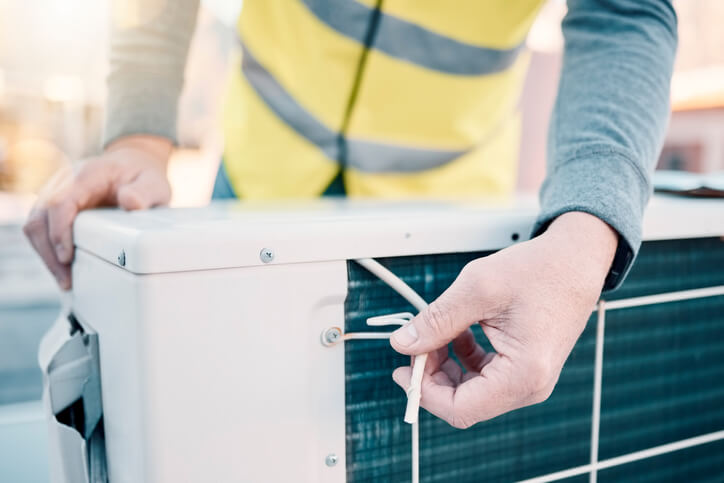
Build Gradually During Your HVAC Technician Training While Investing in Versatile Tools
When assembling a budget-friendly toolkit, focus on versatile tools that perform multiple functions. Opting for quality items like an adjustable wrench or a multi-bit screwdriver saves money and conserves valuable space in your toolkit. Choosing tools that can handle various tasks enhances efficiency and ensures you’re well-prepared for the diverse challenges you may encounter in your HVAC technician career.
Ultimately, assembling a toolkit is an ongoing process. Begin with fundamental tools and incrementally expand your collection as your budget permits. The advantage of this strategy is that it alleviates financial strain and allows you to determine which tools are essential for your specific job responsibilities. With this approach, you can tailor your toolkit to meet your evolving HVAC technician needs, ensuring a cost-effective and well-curated set of tools in the long run.
Interested in obtaining your HVAC technician diploma?
Contact NATS for more information.
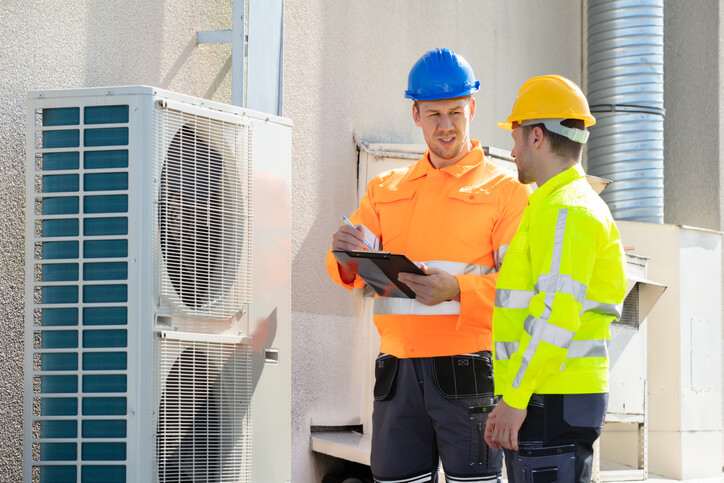
The journey to becoming a full-fledged HVAC Technician will require you to pass your Gas Technician exams. These exams provide a route to proving your professional competence and qualification in diploma and meeting key licensing requirements that prepare you for a lifetime of practice.
It is mostly by making the mark in these exams that you can give your career a big push, even after all the years of HVAC technician training and work experience. This is why it is important to prepare adequately for your Gas Technician exams. Here, we have provided a few crucial tips to help you prepare for and ace these exams. They are discussed below:
Create a Study Plan and Schedule and Stick to it Throughout HVAC Technician Training
To prepare adequately for your gas technician exams, you need to create a plan that’ll account for your study, practice, and other relevant exam conditions. You must try to settle on a study schedule and a comfortable study location and method that’ll give you enough room to cover sufficient grounds as well as a consistent process to fall back on. You may plan for a physical group study of your peers if you are comfortable with it or check into virtual forums.

Gather relevant study materials, practice resources, gas codes, and other resources that’ll help your course. Set out times for reviewing your learning materials from your HVAC technician training and taking on previous exam questions. And after setting up the schedule, make a conscious effort to follow through on it.
Extensively Review Your Training Materials
The notes, textbooks, and other learning resources from your HVAC Technician courses should provide a handy study guide for exam purposes. So you must go over these materials and get the entire gist of what they contain to prepare you for your upcoming exams. Get a solid grasp of the key concepts behind important topics and research supporting data to break them down into their base form.
You should find notes on such topics as piping systems, safe practices, local codes and regulations, gas heating basics, and other critical subjects. And when you do, ensure to review them in detail, making sure to note down important points and problem areas that you can seek further clarity on.
Practice Previous Exam Questions and Use Exam Prep Guides
Gas technician exams from previous years can provide a critical study/exam practice guide for most people. And by solving the problems from these exams repeatedly, you can set yourself up nicely for a successful exam. You’d be coming to terms with the likely exam questions and the topics they touch on while also familiarizing yourself with the exam format and other conditions.

By getting the right answers to these questions, you can get an even better understanding of your study materials. This is the same for exam prep books that focus on key areas. They can help you provide targeted learning and give you improved exam leverage.
Get Relevant Practical Experience
Some of your gas technician exams will test your appreciation of certain technical skills and knowledge relevant to your discipline. To give you a good chance of success in these exams, ensure to get as much hands-on practice as possible. Your HVAC diploma program should equip you with this practical experience, and further practice beyond the classroom can help you gain extra ground.
Try your hands on critical practical applications/skills like inspection of leaks, venting, and other HVAC installations. Practice with relevant work tools like fasteners, analyzers, cutters, and benders. Work on real-life scenarios that require your use of these skills and you’d be giving yourself a solid headstart in your upcoming exams and future work/career pursuits.
Are you interested in HVAC Technician training?
Explore the HVAC Technician diploma program at the North American Trade School (NATS).
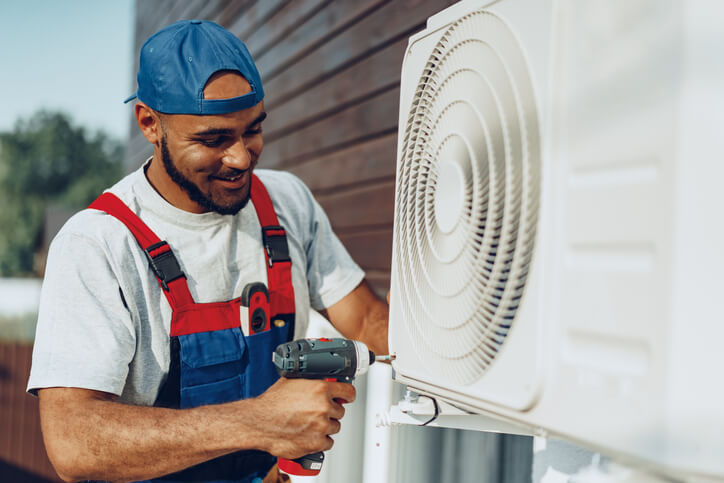
If you’re thinking of starting an HVAC career, there are many tools you’ll need to get acquainted with, as you’ll use them both during your training and throughout your career. In addition to basic hand tools that most tradespeople need to complete basic tasks, such as screwdrivers, power drills, hammers, and pliers, there are several industry-specific tools you’ll use. With the knowledge and skill to use these tools, your work will be done more efficiently. Read on for a brief introduction to some standard HVAC tools you’ll use after training.
Carbon Monoxide Detectors Are Essential for Safety
As an HVAC technician, you’ll come into contact with many different sources of carbon monoxide gas. These include leaking chimneys, back drafting from gas water heaters, wood burners, furnaces, generators, and any poorly maintained combustion device. Inhaling this deadly molecule deprives the body of oxygen, and in the case of carbon monoxide poisoning, you may only notice some mild symptoms like headache, dizziness, or fatigue. Since carbon monoxide gas is undetectable, you’ll need to use detectors. These devices sound an alarm when an unsafe amount of carbon monoxide is detected in the air. They can be life-saving.
Refrigeration Gauges Allow You to Manifold Gas and Liquid Pressure
After HVAC Technician training, you’ll use manifold gauges frequently. In fact, many consider them essential HVAC tools. They measure the pressure of liquids and gasses in a cooling system and are used primarily as a diagnostic tool, alerting you to any problems with the operation of a system. They can also be used as a service tool, releasing moisture, debris, or contaminated refrigerant from a system. Using a manifold gauge, you can add refrigerant to a cooling system. Digital gauges offer more efficiency and accuracy.
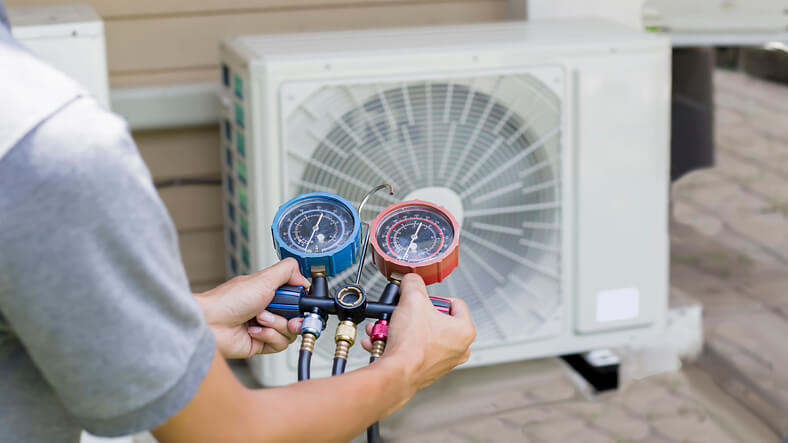
You’ll Use a Multimeter Regularly After HVAC Technician Training
Multimeters are essential tools that you’ll regularly use after completing HVAC courses. They are used for safety reasons to detect electrical current and notify you of the presence of voltage in order to protect you from electrocution. Multimeters also aid in the troubleshooting of electrical components within a cooling system, like switches, wires, and outlets. It’s important that you use a multimeter specifically designed for HVAC technicians with a thermocouple (air temperature sensor) with a 1000-degree range. HVAC multimeters should also have attachments that are compatible with the electrical components of ventilation systems.
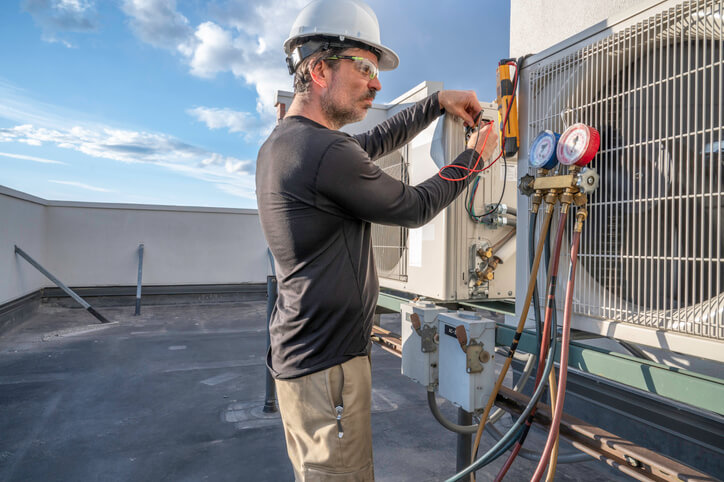
HVAC Software Will Help You Streamline Your Workflow
As an HVAC technician, your success depends greatly on your ability to manage your time, keep track of your invoicing, and maintain good customer relationships. Industry-specific business software can help you greatly improve your efficiency. Software tools that feature drag-and-drop scheduling streamline the invoicing process, and customer relationship management technology are great options you might work within your career.
Our HVAC Technician diploma program is designed to prepare students for the G3 and G2 Gas Technician exam with hands-on training from expert instructors. North American Trade Schools is accredited by the Technical Standards and Safety Authority (TSSA). The TSSA promotes and enforces public safety in Ontario. Our HVAC Technician Diploma Program and all of the career training programs we offer meet the standards set by the TSSA, meaning that you can trust us to provide all the skills needed to become a certified HVAC technician.
Are you ready to attain your HVAC Technician diploma?
Contact NATS to find out how you can get started.
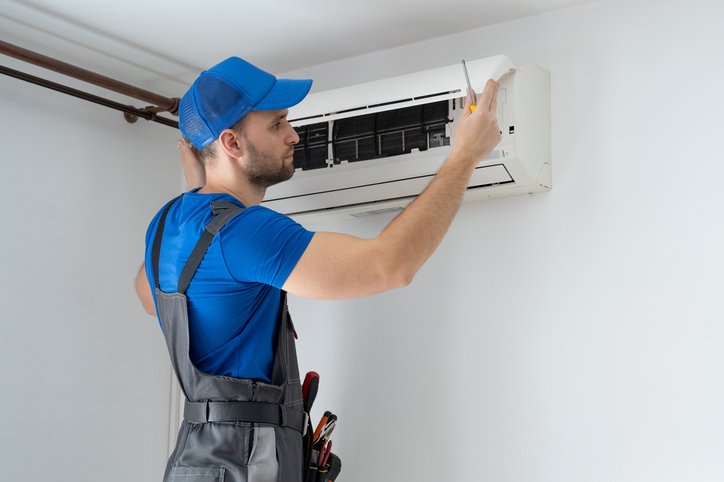
An HVAC Technician is a skilled professional that installs, repairs, and maintains, heating, ventilation, air conditioning, and refrigeration units. If you are considering becoming an HVAC Technician, there are certain safety principles you will need to know and remember. Once you start your career, you will find that you’ll be working with noxious gasses and electrical systems, and as such, you’ll need to remember safety protocols to avoid any harm. Read on for some safety practices you’ll want to remember throughout your training and career.
Wear PPE After HVAC Technician Training
As an HVAC Technician, you are likely to be exposed to noxious fumes, as well as other particles such as dust, debris, and chemicals which may cause harm. It is essential always to wear personal protective equipment (PPE) while you work. For instance, a respirator will help protect you against fumes, and safety goggles can help protect your eyes against any debris or harmful liquids. Other important PPE you may need as an HVAC Technician includes:
- Safety gloves
- A hard hat
- Non-slip shoes
- Earplugs
During your HVAC Technician Diploma program, you will learn the importance of protective gear, including how it should be worn and why it is needed in different scenarios. For example, wearing earplugs when working in a loud environment can help avoid damaging your hearing. Always wearing your safety gear on the job will help prevent you from suffering serious harm.
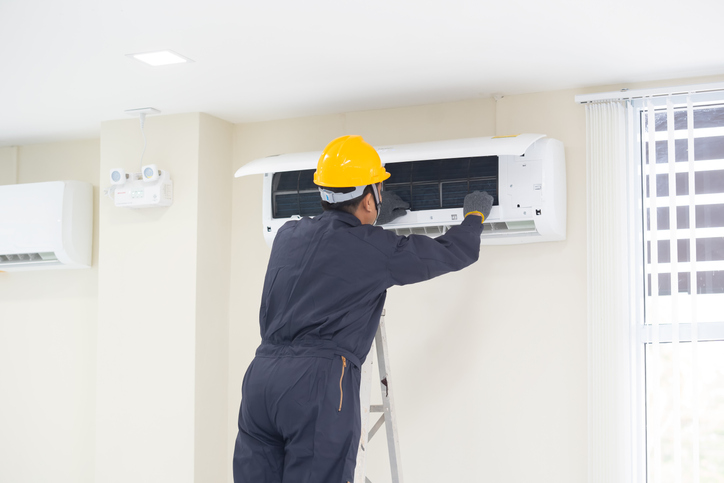
Be Cautious When Handling Chemicals
An important safety practice to always consider while working as an HVAC Technician is to be cautious with chemicals. You will be working with chemicals daily, and some, such as solvents and refrigerants, can be very harmful if not handled correctly. They may cause burns or in some severe cases, poisoning. During HVAC Technician training, you will be taught how to handle these chemicals safely.
Practical examples will be given and overseen by instructors, where you will need to dispose of, replace, and transport chemicals safely. This will be done using the knowledge of rules and regulations you learn during your training. For example, you’ll learn how to remove and store refrigerant chemicals safely.
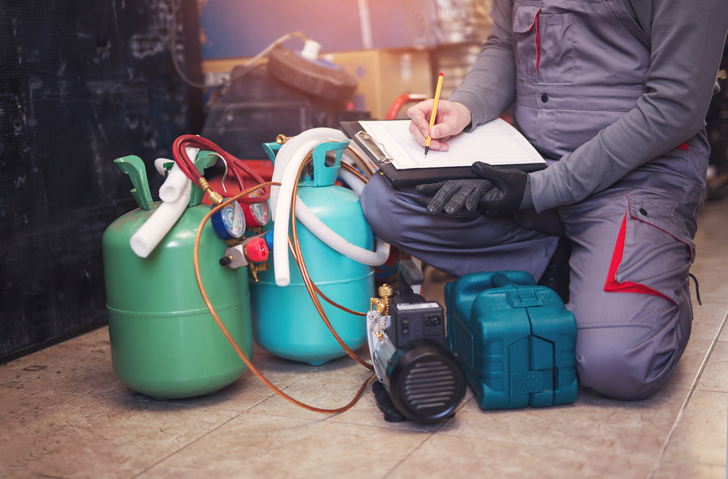
Turn Off the Electricity While you Work
When working with units that have a water system or have general electrical issues, it is safer to turn off the main circuit breaker before starting work. Water is a conductor of electricity and can cause electrocution. Water leaking onto the unit you are working on may also be damaging to the unit, as it may cause a short circuit. This can be not only damaging for the unit but is a safety and fire hazard, as well. Additionally, it will be essential to analyze a unit before you begin working on it to see if there are any fluid leaks. This will help you better understand if you need to turn off the main circuit breaker.
The HVAC training you receive at NATS will help you identify leaks, teach you how to fix them, and help you understand the safety practices to follow throughout your career.
Are you ready to begin training for your HVAC Technician career?
Contact NATS to learn how you can get started!
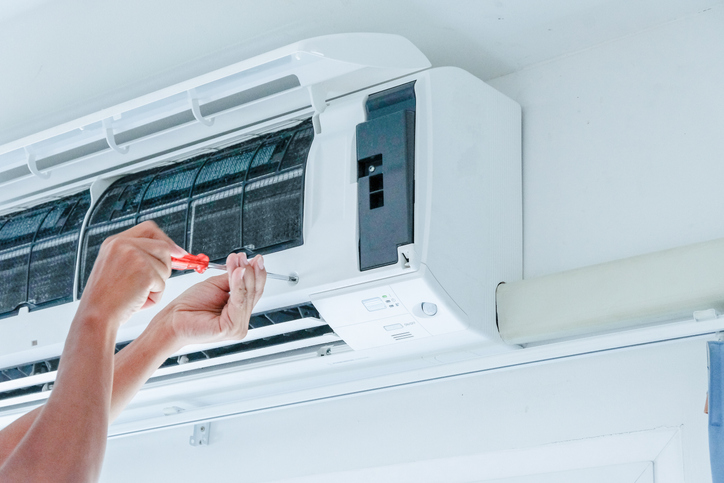
In recent years, we’ve seen record-high temperatures across the globe. Many homeowners are recognizing the importance of good ventilation and cooling units–and that’s where you come in as an aspiring HVAC technician.
HVAC technicians are responsible for the installation, maintenance, and repair of heating, ventilation, and air conditioning systems. Here are a few installation tips to remember when installing HVAC units, and how our HVAC technician program can help you launch a successful career in this industry!
1. Start by Determining Your Heating and Cooling Loads
The heating and cooling load refers to the rate at which heat should be supplied to or removed from a space in order to maintain a particular temperature range. Several factors go into determining this like the location, size, and age of a home. In addition, you’ll need to take into account the materials that were used to make up a home, the number of doors and windows, the amount of direct sunlight, the amount of shade, and whether or not the homeowners have special needs due to allergies and other health conditions.
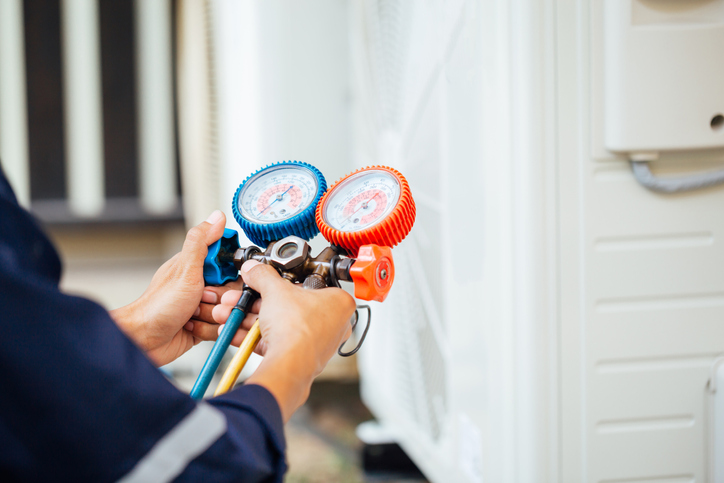
Once you’ve come up with this important information, you can go on to take a look at the ductwork that’s been done and make any needed repairs or replacements. As you’ll learn in HVAC technician training, poor ductwork can cause imbalances and, as a result, block airflow and decrease air quality. To boost your ductwork, you may consider adding insulation that can improve the performance of HVAC systems.
2. Be Sure That You’ve Chosen the Correct Sized Unit
A large unit is not always better. If a system is too large for a homeowner’s space, it actually becomes inefficient. In fact, systems that are too large for a particular space can experience degradation faster, which will affect the longevity and performance of the unit. That being said, a small unit wouldn’t be appropriate for a large space as it will not effectively heat or cool the space.
How can you ensure that you’ve sized the unit correctly? First, determine the square footage of the space. Then, multiply the square footage by 25 BTU (British thermal units), the rough amount of energy it takes to heat or cool one square foot. This will give you your base BTU amount. Finally, take the height of the ceilings into account. If the ceilings are above 8 feet, multiply the base BTU amount by 1.25. This is a very basic calculation that does not take into account the climate, amount of people living in the home, or the number and placement of doors and windows. You’ll learn more about this process in HVAC school.

3. Make it a Habit to Check Your Lines After HVAC Technician Training
Refrigerant lines connect an outdoor air conditioner or heat pump to the indoor evaporator coil. It’s essential to check these lines for leaks. If you find refrigerant lines that are in poor condition, be sure to run high-quality replacement lines in a location that provides easy access. In the HVAC Technician Diploma program at NATS, you’ll learn how to install and maintain HVAC systems and work with tools like metal snips, electric drills, testing devices, and more. Students can write their G3 gas technician exam after the first module and the G2 gas technician exam after graduation.
Interested in our HVAC technician diploma program?
Contact NATS to learn more!
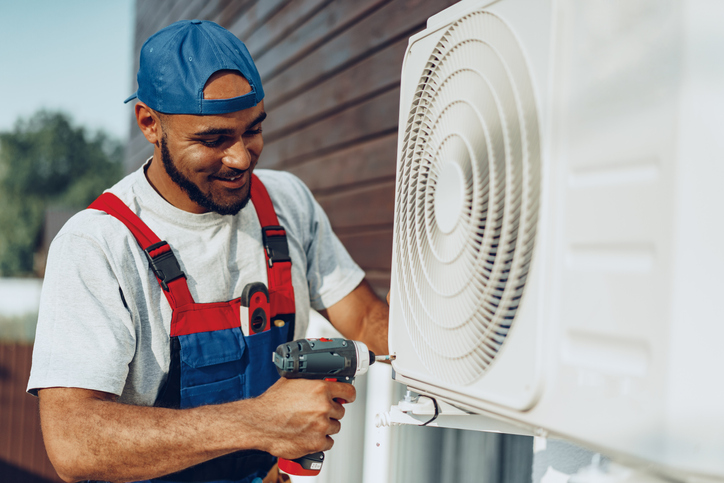
HVAC (Heating, Ventilation and Air Conditioning) systems are great for making life more comfortable. But when they’re not installed properly, they can be dangerous–causing fires, explosions or emitting toxic fumes. If you’re considering a career as an HVAC technician, you’ll be responsible for installing, repairing and maintaining these systems. In order to do so safely, you’ll need to be well versed in industry regulations and practices. When working with systems that utilize natural gas, propane, butane, hydrogen, methane, and mixed gasses, you’ll be adhering to a variety of gas codes or guides that dictate how to safely install and repair these systems based on the type of gas you’re working with.
At North American Trade Schools (NATS), you’ll become familiar with relevant gas codes–in addition to building other practical skills and knowledge for a career as an HVAC technician. Below, learn more about what gas codes are and why your knowledge of them will be important after completing your HVAC training at the North American Trade Schools.
What are Gas Codes?
Gas codes are used by technicians and inspectors to guide the safe installation of appliances and piping. As an HVAC technician, you’ll need to ensure that you’re familiar with the codes in the municipality where you’re working before installing, repairing or inspecting a fuel system. There are several key codes to follow when it comes to working with fuel systems. For one, you’ll learn about the International Fuel Gas Codebook (IFGC), a widely used guide agreed upon by engineers but not to be confused with manufacturer codes. Manufacturer codes supersede the IFGC when the two conflict, as all products from manufacturers, are tested by regulatory agencies before approval.
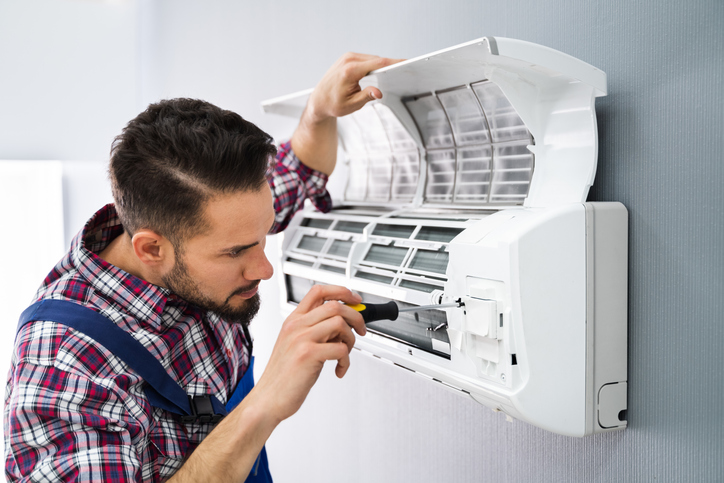
What’s in the International Fuel Gas Codebook?
The International Fuel Gas Codebook contains eight chapters of important safety information. In your HVAC technician courses, you’ll receive guidance on how to interpret and apply the information in the IFGC to your work on site. The first chapter deals with administration; defining what is covered under each code and the provisions put in place for departments of inspection. The second chapter covers important definitions. Chapter three outlines general safety regulations such as hazardous locations for appliances, combustion, dilution air, and ventilation requirements. The following chapters outline best practices for gas piping installations, chimneys and vents, specific appliances, gaseous hydrogen systems and more. Equipped with the knowledge of the IFGC after your training, you’ll be prepared to safely and knowledgeably perform work on any HVAC system.

When Can You Expect to Use Gas Codes as an HVAC Technician?
When you begin your career in HVAC, you’ll use the IFGC and other regional and manufacturer gas codes to guide your approach to installing, maintaining, and repairing gas systems. Throughout your career, you’ll want to consistently refresh your knowledge of gas codes, keeping updated on any regulatory changes.
If you’re seeking a career as an HVAC technician, it’s important to prepare for the workforce with hands-on instruction and gain practical experience using state-of-the-art equipment. At NATS, our HVAC Technician Diploma Program offers a high level of support for students, and you can expect to learn everything you need to know about gas codes and safety regulations from our experienced instructors.
Ready to start HVAC school?
Contact NATS today!



